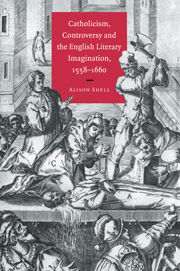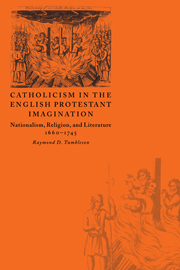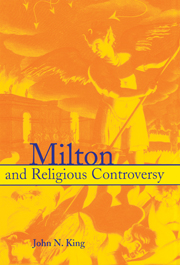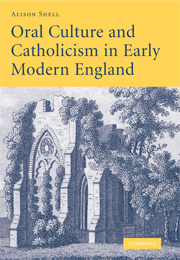Catholicism, Controversy and the English Literary Imagination, 1558–1660
The Catholic contribution to English literary culture has been widely neglected or misunderstood. This book sets out to rehabilitate a wide range of Catholic imaginative writing, while exposing the role of anti-Catholicism as an imaginative stimulus to mainstream writers in Tudor and Stuart England. It discusses canonical figures such as Sidney, Spenser, Webster and Middleton, those whose presence in the canon has been more fitful, and many who have escaped the attention of literary critics. Among the themes to emerge are the anti-Catholic imagery of revenge tragedy and the definitive contribution made by Southwell and Crashaw to the post-Reformation revival of religious verse in England. Alison Shell offers a fascinating exploration of the rhetorical stratagems by which Catholics sought to demonstrate simultaneous loyalties to the monarch and to their religion, and of the stimulus given to the Catholic literary imagination by the persecution and exile so many of these writers suffered.
- A wide-ranging study of an important but neglected literary tradition, based on extensive original research; it will be of interest to historians as well as literary scholars
- Offers a context for mainstream literature of the period, including radical reappraisals of revenge tragedy and religious poetry
- There is a controversial, polemical dimension in the project's challenge to (conscious and unconscious) anti-Catholic prejudice in the way the literature of the period has been studied
Reviews & endorsements
"Alison Shell's new study on Catholicism and the English literary imagination adds another important dimension to this growing body of research...this important book provides an additional accounting of the English literary imagination. In an age of the exploding canon and sensitivity to long-silenced voices, this step seems long overdue. These recusant writers, in spite of continued persecutions and hardships, produced literary works well sorth reading and studying. Alison Shell makes a compelling case why this is so." South Atlantic Review
"Catholicism, Controversy, and the English Literary Imagination, 1558-1660 is an complex study of Catholic poets and dramatists in what is perhaps the most complex period of English literary and religious history. Shell's approach to the religious and literary changes of this period is refreshingly candid. Most of the traditional literary historians simply group everything under the heading Christian, and as the author has shown, the differences are both confessional and aesthetic. All in all, Shell writes a very learned and interesting book." Church History
"This is a book of genuine and impressive learning." Albion
"...Catholic literary expressions-poetry, elegies, drama illustrates the Catholic imagination facing the demise of the "true" church, and their relationship to monarchy and nation." Religious Studies Review
"immensely rich and helpful." Jrnl of English & Germanic Philology
"Shell's methodology demonstrates both breadth and depth of scholarship...By examining many poems and plays both familiar and obscure, Shell weaves a mosaic that form a rather comprehensive picture of both Catholic and anti-Catholic literature of the period." Christianity & Literature
"This is an important and significant book for all who are interested in the literature and history of Tudor-Stuart England. It raises many important questions about the canon of English literature and about prejudice 400 years ago and prejudice in the twenty-first century." The Journal of Religion
"Shell is at her best, and her book of great value, in excavating to our view a whole array of writers and texts that should be better known: to read her is to discover, again, how much one hasn't accounted for."
Tom Bishop, Cast Western Reserve University, Religion & Literature
Product details
November 2006Paperback
9780521032148
324 pages
228 × 151 × 18 mm
0.484kg
1 b/w illus.
Available
Table of Contents
- Acknowledgements
- List of abbreviations
- Note on the text
- Introduction
- Part I. Catholics and the Canon:
- 1. The livid flash: decadence, anti-Catholic revenge tragedy and the dehistoricised critic
- 2. Catholic poetics and the Protestant canon
- Part II. Loyalism and Exclusion:
- 3. Catholic loyalism: I. Elizabethan writers
- 4. Catholic loyalism: II. Stuart writers
- 5. The subject of exile: I
- 6. The subject of exile: II
- Conclusion
- Notes
- List of works frequently cited
- Index.






